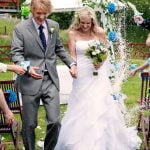When it comes to planning a wedding, the assistance of a professional can make all the difference in ensuring that everything runs smoothly and according to plan. This is where the role of a wedding coordinator comes into play. But what does a wedding coordinator do exactly? In this article, we will delve into the responsibilities and tasks that wedding coordinators take on to help couples navigate the complexities of planning and executing their special day.
Wedding coordination involves much more than just making sure that everything looks pretty on the day of the ceremony. From the pre-wedding phase to post-wedding duties, wedding coordinators play an integral role in every aspect of the planning process and execution of the event. They are there to ensure that all details are accounted for and that any unexpected challenges are met with quick thinking and effective problem-solving.
Throughout this article, we will explore the various tasks and responsibilities that fall under the umbrella of wedding coordination. From vendor management to timeline management, bridal party coordination to on-site logistics, we’ll take an in-depth look at how wedding coordinators support couples in bringing their dream weddings to life. So sit back, relax, and let’s uncover exactly what a wedding coordinator does.
The Pre-Wedding Phase
Initial Consultation and Goal Setting
One of the primary tasks of a wedding coordinator during the pre-wedding phase is to conduct an initial consultation with the couple to understand their vision for the event. This involves discussing their preferences, budget, timeline, and overall expectations. Once these details are established, the wedding coordinator assists in setting realistic goals and objectives for the planning process.
Venue Selection and Logistics
After establishing the couple’s vision for their special day, a wedding coordinator takes on the responsibility of scouting potential venues based on their requirements. This includes coordinating site visits, negotiating contracts, and managing logistical details such as parking, guest accommodations, and accessibility. The wedding coordinator also works closely with vendors to ensure that all necessary permits and licenses are secured for the chosen venue.
Vendor Coordination and Contract Management
Another essential role of a wedding coordinator during this phase is managing vendor relationships. This involves researching, recommending, and booking suitable suppliers such as caterers, florists, photographers, DJs or bands, transportation services, and more. Additionally, they oversee contract negotiations on behalf of the couple to ensure that all agreements are fair and comprehensive. By having a professional handle these tasks, couples can focus on other aspects of their wedding without feeling overwhelmed by endless options and decisions.
By understanding how a wedding coordinator assists with planning and preparation during the pre-wedding phase, couples can appreciate the importance of having someone dedicated to orchestrating all the intricate details leading up to their special day. In doing so, they can approach their wedding with more confidence knowing that they have an experienced professional overseeing every step of their journey towards matrimonial bliss.
Vendor Management
Coordinating With Vendors
One of the most important responsibilities of a wedding coordinator is managing all the vendors involved in the wedding. This includes communicating with caterers, florists, photographers, musicians, rental companies, and more. The wedding coordinator acts as the point of contact for all vendors, ensuring that each one understands their roles, responsibilities, and timelines for the event. They also coordinate delivery times and set-up details to ensure that everything runs smoothly on the big day.
Negotiating Contracts
In addition to coordinating with vendors, a wedding coordinator is often involved in negotiating contracts and pricing with various suppliers and service providers. They use their industry knowledge and experience to ensure that couples get the best services within their budget. This can include securing discounts or special offers from vendors to help couples save money without sacrificing quality.
Troubleshooting Vendor Issues
Throughout the planning process, a wedding coordinator may encounter challenges with vendors such as scheduling conflicts, product shortages, or unexpected changes in services. It is their responsibility to quickly resolve these issues and find alternative solutions when necessary to minimize any impact on the wedding day itself.
Additionally, they may need to mediate disputes between vendors or help manage last-minute requests or changes from suppliers. Ultimately, the goal is to alleviate stress from the couple by handling any vendor-related issues efficiently and effectively.
Overall, vendor management is a crucial aspect of what does a wedding coordinator do as it allows them to ensure that all aspects of the event come together seamlessly for a truly memorable celebration.
Timeline Management
A wedding coordinator plays a crucial role in ensuring the smooth flow of events on the big day. They are responsible for meticulously planning and managing the timeline to ensure that everything runs according to schedule. Here are some key aspects of timeline management that highlight what does a wedding coordinator do:
- Creating a detailed timeline: A wedding coordinator works closely with the couple to create a comprehensive timeline for the entire wedding day, from the pre-ceremony preparations to the reception and beyond. This includes scheduling arrival times for vendors, hair and makeup appointments, photography sessions, and the start and end times for each part of the celebration.
- Coordinating transitions: Transitioning from one part of the wedding day to the next can be challenging, but a skilled wedding coordinator excels at seamlessly moving guests, bridal party members, and vendors from one activity to another. Whether it’s guiding guests from the ceremony to the cocktail hour or ensuring that everyone is in place for important moments like cake cutting or first dances, their attention to detail is essential.
- Managing unexpected delays: Despite meticulous planning, unexpected delays can occur during a wedding day. A wedding coordinator must be prepared to adapt and adjust timelines as needed while keeping things on track as much as possible. Whether it’s due to traffic, unforeseen issues with vendors, or inclement weather, their ability to think on their feet and make quick decisions is invaluable.
Overall, timeline management is a critical aspect of what does a wedding coordinator do. By overseeing every minute detail of the schedule and effectively managing transitions and unexpected challenges, they play an essential role in ensuring that couples can relax and enjoy their special day without worrying about any logistical hiccups.
Problem-Solving
When it comes to wedding coordination, one of the most important aspects of the role is the ability to problem-solve and handle unexpected challenges and emergencies. A skilled wedding coordinator is someone who can think on their feet, remain calm under pressure, and quickly find solutions to any issues that may arise before or during the wedding day.
Here are some key ways in which wedding coordinators handle unexpected challenges and emergencies:
- Quick thinking and decision-making: Wedding coordinators must be able to make quick decisions in high-pressure situations. Whether it’s a sudden change in weather, a vendor running late, or a last-minute guest seating issue, the coordinator needs to be able to assess the situation and make the necessary adjustments to ensure that everything runs smoothly.
- Crisis management: From wardrobe malfunctions to transportation delays, wedding coordinators need to be prepared for any potential crisis. They must have contingency plans in place for various scenarios and be ready to spring into action if something goes wrong.
- Communication with vendors and stakeholders: In the event of an emergency, wedding coordinators need to effectively communicate with all relevant parties, including vendors, venue staff, and the couple themselves. Clear communication is essential for resolving issues quickly and efficiently.
Ultimately, a skilled wedding coordinator plays a crucial role in ensuring that unexpected challenges and emergencies are handled effectively, allowing the couple to enjoy their special day without unnecessary stress or worry.
Bridal Party Coordination
A wedding coordinator plays a crucial role in ensuring that the bridal party is well-coordinated and informed leading up to and during the wedding day. This involves not only providing support to the bride, groom, bridesmaids, and groomsmen but also ensuring that everyone involved in the wedding is aware of their responsibilities and the overall schedule for the day.
The wedding coordinator acts as a point of contact for the bridal party, addressing any concerns or questions they may have while also keeping them updated on any changes to the plan.
In addition to offering emotional support and guidance to the bridal party, a wedding coordinator is responsible for making sure that everyone understands their roles throughout the event. Whether it’s coordinating dress fittings, hair and makeup schedules, or timing for pre-ceremony photos, the wedding coordinator facilitates clear communication and organization among the entire bridal party.
They also ensure that all members of the bridal party are aware of any last-minute adjustments or changes to the timeline so that everyone can stay on track and work together seamlessly.
Ultimately, effective bridal party coordination can greatly impact the overall success of a wedding day. By having a dedicated professional overseeing this aspect of the event, couples can rest assured that their closest friends and family members will feel supported and informed every step of the way. This allows everyone to focus on celebrating and enjoying this special occasion without having to worry about logistics or coordination issues.
| Role | Description |
|---|---|
| Bridal Party Support | A wedding coordinator provides emotional support and guidance to the bridal party. |
| Communication Facilitator | The coordinator facilitates clear communication among members of the bridal party regarding schedules and responsibilities. |
| Logistical Coordinator | They ensure that everyone understands their roles throughout the event, including dress fittings, hair/makeup schedules, and photo timings. |
On-Site Coordination
Once the big day arrives, a wedding coordinator’s role shifts to on-site coordination. This involves overseeing the set-up of the ceremony and reception venues, managing décor elements, and ensuring that all logistical aspects are in place for a seamless event. The wedding coordinator works closely with vendors, venue staff, and other relevant parties to ensure that everything is executed according to plan.
One of the key responsibilities of a wedding coordinator during on-site coordination is to supervise the setup of the ceremony and reception spaces. This includes managing the placement of chairs, aisle runners, floral arrangements, and any other decorative elements. The coordinator ensures that everything is arranged as per the couple’s vision and coordinates with vendors to address any last-minute adjustments or changes.
In addition to overseeing setup and décor, wedding coordinators also manage logistics on the wedding day. This can involve coordinating vendor deliveries and setups, ensuring that timelines are adhered to, and troubleshooting any potential issues that may arise. With their extensive experience and ability to think on their feet, wedding coordinators play a crucial role in ensuring that the day runs smoothly from start to finish.
Overall, on-site coordination is a pivotal aspect of what does a wedding coordinator do as it allows them to bring together all aspects of planning into one cohesive event. Their attention to detail, organizational skills, and ability to handle unexpected challenges make them invaluable in creating a memorable and stress-free wedding day for couples.
Post-Wedding Duties
After the wedding day has come and gone, a wedding coordinator’s job is not yet complete. This phase involves wrapping up any loose ends and ensuring that the celebration concludes smoothly. One of the primary responsibilities during this phase is overseeing the breakdown and cleanup of the venue.
This may involve coordinating with vendors to ensure that all rental items are returned, decorations are taken down, and the venue is left in the same condition it was found. Additionally, final payments or gratuities to vendors may need to be distributed, which is often handled by the wedding coordinator.
Another crucial aspect of post-wedding duties is managing any leftover supplies or items from the celebration. This includes packing up gifts, leftover food, beverages, and assisting with transporting them to a designated location. In some cases, couples may choose to donate leftover items to local charities or organizations, and it’s typically the wedding coordinator’s responsibility to facilitate this process.
Furthermore, wedding coordinators play an essential role in ensuring that any outstanding contracts or agreements with vendors are fulfilled after the event. This can include returning rental equipment, confirming final headcounts for catering purposes, and addressing any outstanding issues related to services provided during the wedding ceremony and reception.
| Responsibility | Description |
|---|---|
| Venue Cleanup | Overseeing breakdown and cleanup of the venue |
| Managing Leftover Supplies | Packing up gifts, leftover food, beverages and assisting with transportation |
| Vendor Follow-Ups | Ensuring outstanding contracts/agreements with vendors are fulfilled after the event |
Conclusion
In conclusion, a wedding coordinator plays a crucial role in ensuring the smooth and stress-free execution of a couple’s special day. From the pre-wedding phase to on-site coordination and post-wedding duties, their responsibilities are vast and varied. A wedding coordinator not only assists with planning and preparation but also manages vendors, handles timeline management, problem-solving, bridal party coordination, and oversees setup and logistics on the actual wedding day.
Their impact on a couple’s special day cannot be overstated. By alleviating the burden of logistics and coordination, they allow the couple to fully enjoy their celebration without worrying about the details. The value of a skilled wedding coordinator lies in their ability to handle unexpected challenges and emergencies with grace and professionalism, ultimately ensuring that everything runs seamlessly.
So, to answer the question “what does a wedding coordinator do?” – they do everything possible to ensure that a couple’s wedding day is as perfect as they imagine it to be. Their attention to detail, organizational skills, vendor relationships, and ability to troubleshoot make them an invaluable asset in creating unforgettable memories for the bride, groom, and their loved ones.
Frequently Asked Questions
What Are the Duties of a Wedding Coordinator?
The duties of a wedding coordinator include organizing all aspects of the wedding day, from creating timelines and managing vendors to coordinating the ceremony and reception. They ensure that everything runs smoothly and according to the couple’s wishes.
What Is the Difference Between a Wedding Coordinator and Wedding Planner?
The main difference between a wedding coordinator and a wedding planner lies in their level of involvement. A wedding coordinator typically focuses on the logistical details and coordination on the actual wedding day, while a wedding planner is involved in the entire planning process leading up to the big day.
How Necessary Is a Wedding Coordinator?
Many couples find a wedding coordinator to be extremely necessary for their big day. With so many moving parts and details to coordinate, having a professional to manage everything can alleviate stress and allow the couple to truly enjoy their special day without worrying about logistics.

Welcome to my blog about home and family. This blog is a place where I will share my thoughts, ideas, and experiences related to these important topics. I am a stay-at-home mom with two young children. I hope you enjoy reading it! and may find some helpful tips and ideas that will make your home and family life even better!





